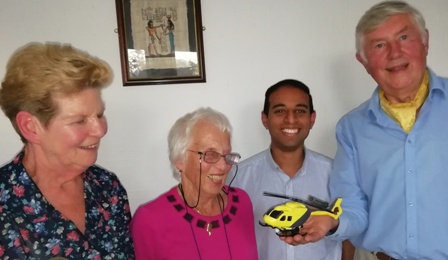
Recycling was back on the agenda when Leicester Novus Rotary met to hear about the organisation Helipads for Hospitals.
Former RAF helicopter pilot John Nowell spoke briefly about his RAF career — “I was too tall to be a fighter pilot, as I wanted, so I flew helicopters” — before talking about his voluntary work as a pilot for the air ambulance.
These, he said, cost about £1.7 million a year each to keep in the air. And yet, with the population of the UK standing at 66 million, that costs each person only £1 per year.
Fifty-five per cent of patients are taken by air ambulances after being involved in road traffic collisions. John and his colleagues also work closely with mountain rescue teams — volunteers he clearly admires for their ability to run up Sca Fell carrying a stretcher in an hour.
The problem, he explained, is that many hospitals, including Leicester Royal Infirmary and even the Queen’s Medical Centre in Nottingham, do not have suitable landing grounds on their premises. At Leicester Royal Infirmary, patients can be landed on Nelson Mandela Park but then have to be manhandled into a wheeled ambulance and stretchered into the hospital.
The solution, he said, lies in recycling.
People in the UK throw away 50 million aluminium cans each week. He urged his audience to recycle aluminium cans. A million cans, he said, could be turned into an aluminium landing ground with room for cars to be parked underneath. So far, he and his supporters have collected about 170,000 cans.
In Shepshed, the Rotary club has provided a big red bin into which members of the public dispose of empty drinks cans. Helped by members of Interact, a Rotary-led club for high school students, the number of donated cans is rising impressively.
Details were given by Ngaire (pronounced Nyree) Hall and her husband, Robert, the president of the Rotary Club of Shepshed. Ngaire is the District lead on Interact Clubs.
When there are enough cans to fill a dozen or so bin bags, John goes along with his trailer and takes them to Stocken Prison when inmates use a huge crushing machine to reduce the cans for palletisation before they are smelted into ingots.
The two Leicestershire red bins at Shepshed and Whissendine cost about £500 each.
So enthused were John’s audience, that discussion went on for quite a while with some members offering storage space, some suggesting fundraising events to gather funds for a bin and others talking about buying a foot-operated can crusher and sending it to local fairs and fetes.
Once again, President Jason Chauhan was delighted to welcome to the meeting two academics studying at Leicester University. He also welcomed three members of the Inner Wheel Club of Leicester who brought some cans for John to take away.
If you would like to attend a Rotary meeting, please e-mail us.
Last edited 10.30pm on 30.05.2019


